Principles of Care: Good Practices in Health and Social Care
VerifiedAdded on 2023/06/18
|8
|2389
|477
Report
AI Summary
This report provides a comprehensive overview of the principles of care in health and social care practices. It delves into the five key principles: respect and dignity, confidentiality, privacy, autonomy, and effective communication, highlighting their importance in delivering quality healthcare services. The report also discusses Maslow's hierarchy of needs and its relevance to patient care. Furthermore, it examines the impact of key legislation, policies, and codes of conduct on health and social care practices, emphasizing the rights and autonomy of vulnerable individuals and the significance of risk assessment and anti-discrimination practices, including the Equality Act 2010. The report concludes by underscoring the importance of these principles and practices in ensuring effective and ethical healthcare delivery.
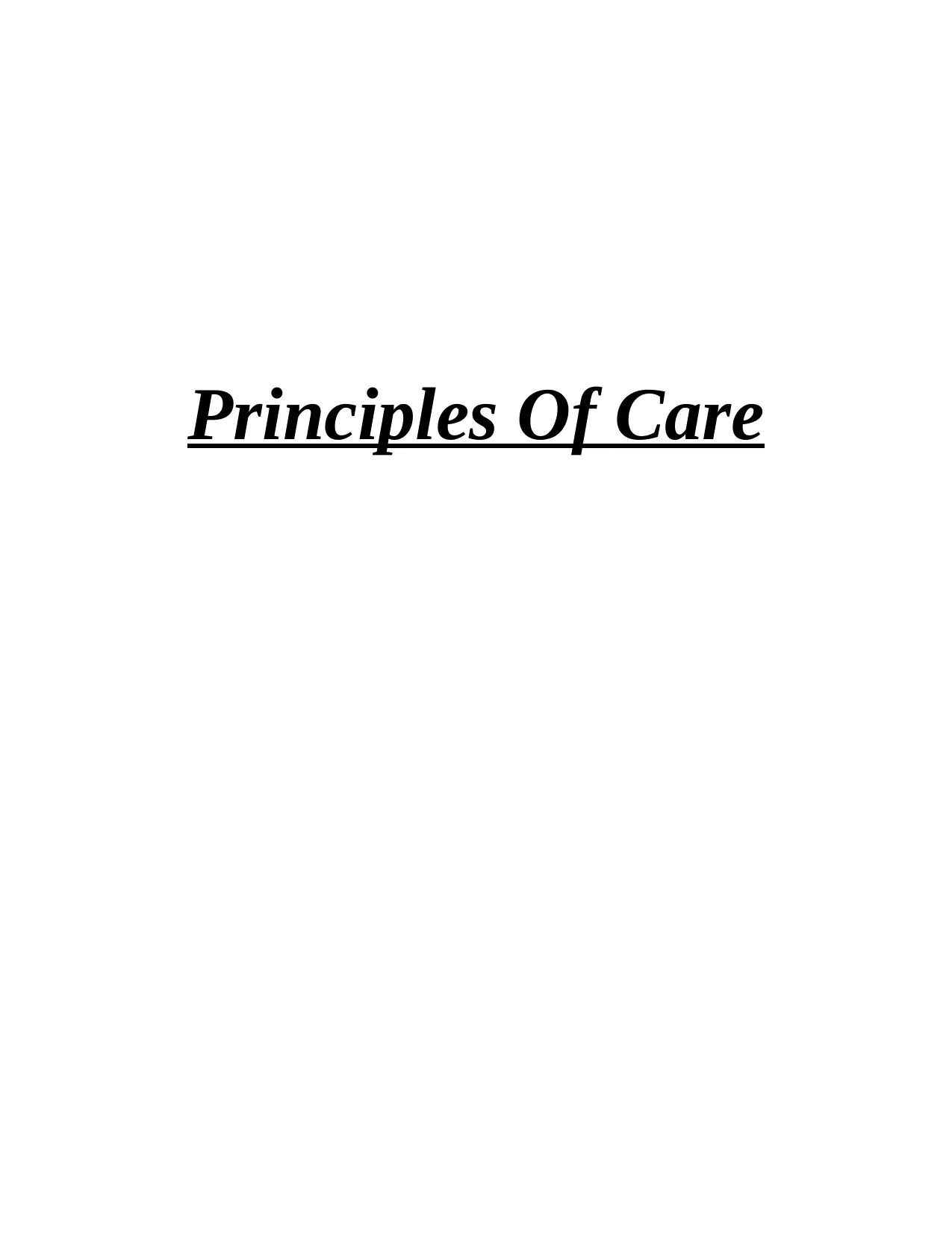
Principles Of Care
Paraphrase This Document
Need a fresh take? Get an instant paraphrase of this document with our AI Paraphraser
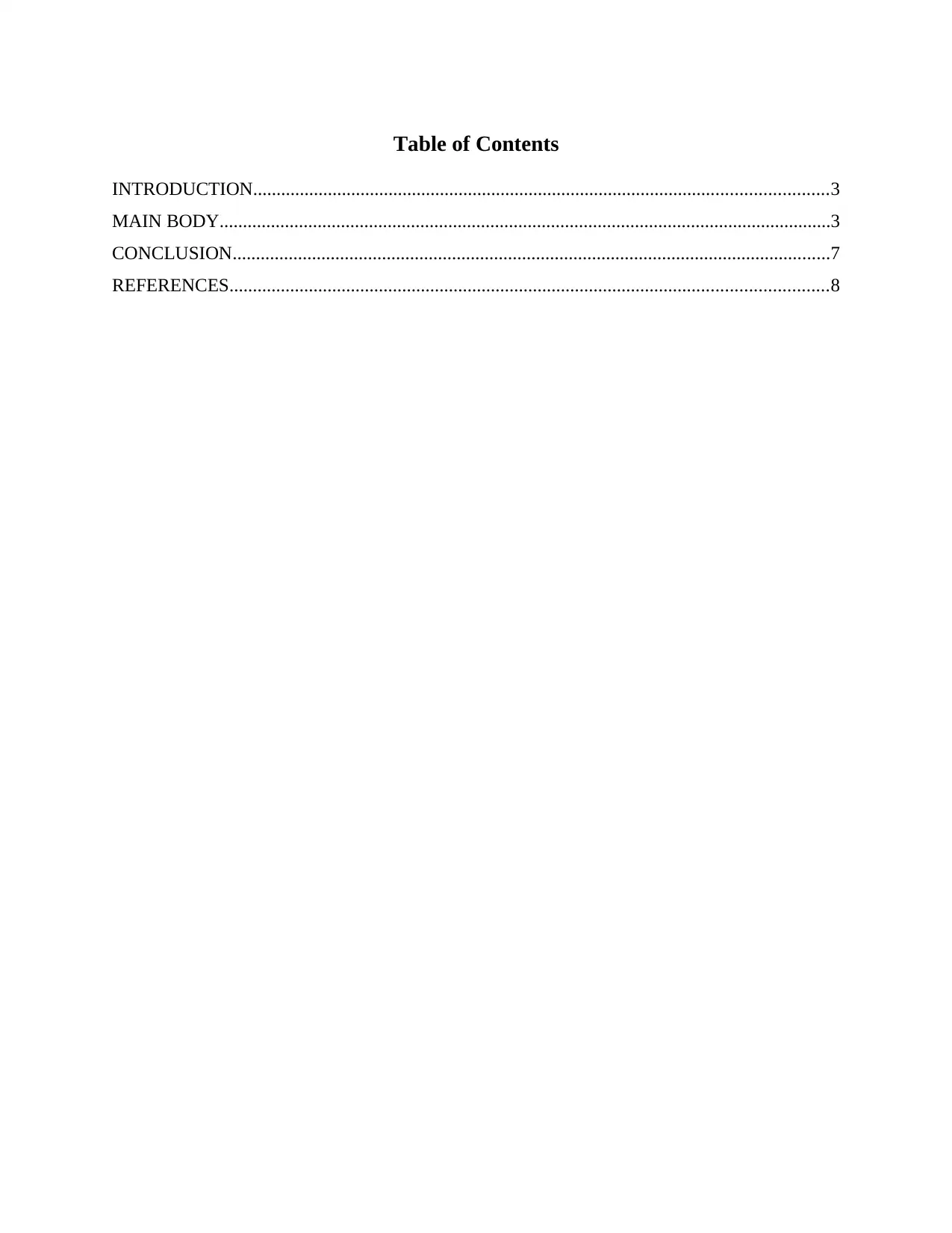
Table of Contents
INTRODUCTION...........................................................................................................................3
MAIN BODY...................................................................................................................................3
CONCLUSION................................................................................................................................7
REFERENCES................................................................................................................................8
INTRODUCTION...........................................................................................................................3
MAIN BODY...................................................................................................................................3
CONCLUSION................................................................................................................................7
REFERENCES................................................................................................................................8
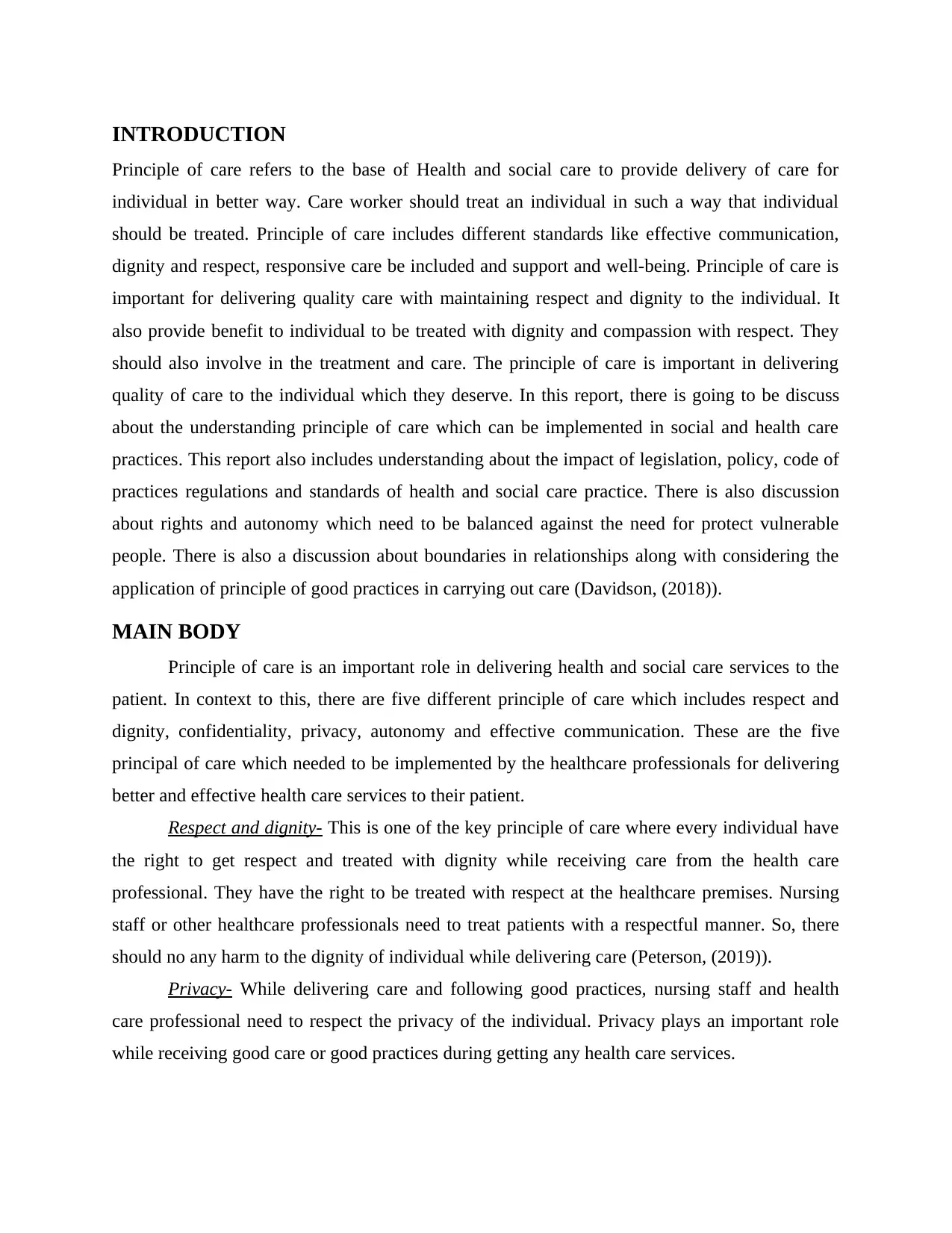
INTRODUCTION
Principle of care refers to the base of Health and social care to provide delivery of care for
individual in better way. Care worker should treat an individual in such a way that individual
should be treated. Principle of care includes different standards like effective communication,
dignity and respect, responsive care be included and support and well-being. Principle of care is
important for delivering quality care with maintaining respect and dignity to the individual. It
also provide benefit to individual to be treated with dignity and compassion with respect. They
should also involve in the treatment and care. The principle of care is important in delivering
quality of care to the individual which they deserve. In this report, there is going to be discuss
about the understanding principle of care which can be implemented in social and health care
practices. This report also includes understanding about the impact of legislation, policy, code of
practices regulations and standards of health and social care practice. There is also discussion
about rights and autonomy which need to be balanced against the need for protect vulnerable
people. There is also a discussion about boundaries in relationships along with considering the
application of principle of good practices in carrying out care (Davidson, (2018)).
MAIN BODY
Principle of care is an important role in delivering health and social care services to the
patient. In context to this, there are five different principle of care which includes respect and
dignity, confidentiality, privacy, autonomy and effective communication. These are the five
principal of care which needed to be implemented by the healthcare professionals for delivering
better and effective health care services to their patient.
Respect and dignity- This is one of the key principle of care where every individual have
the right to get respect and treated with dignity while receiving care from the health care
professional. They have the right to be treated with respect at the healthcare premises. Nursing
staff or other healthcare professionals need to treat patients with a respectful manner. So, there
should no any harm to the dignity of individual while delivering care (Peterson, (2019)).
Privacy- While delivering care and following good practices, nursing staff and health
care professional need to respect the privacy of the individual. Privacy plays an important role
while receiving good care or good practices during getting any health care services.
Principle of care refers to the base of Health and social care to provide delivery of care for
individual in better way. Care worker should treat an individual in such a way that individual
should be treated. Principle of care includes different standards like effective communication,
dignity and respect, responsive care be included and support and well-being. Principle of care is
important for delivering quality care with maintaining respect and dignity to the individual. It
also provide benefit to individual to be treated with dignity and compassion with respect. They
should also involve in the treatment and care. The principle of care is important in delivering
quality of care to the individual which they deserve. In this report, there is going to be discuss
about the understanding principle of care which can be implemented in social and health care
practices. This report also includes understanding about the impact of legislation, policy, code of
practices regulations and standards of health and social care practice. There is also discussion
about rights and autonomy which need to be balanced against the need for protect vulnerable
people. There is also a discussion about boundaries in relationships along with considering the
application of principle of good practices in carrying out care (Davidson, (2018)).
MAIN BODY
Principle of care is an important role in delivering health and social care services to the
patient. In context to this, there are five different principle of care which includes respect and
dignity, confidentiality, privacy, autonomy and effective communication. These are the five
principal of care which needed to be implemented by the healthcare professionals for delivering
better and effective health care services to their patient.
Respect and dignity- This is one of the key principle of care where every individual have
the right to get respect and treated with dignity while receiving care from the health care
professional. They have the right to be treated with respect at the healthcare premises. Nursing
staff or other healthcare professionals need to treat patients with a respectful manner. So, there
should no any harm to the dignity of individual while delivering care (Peterson, (2019)).
Privacy- While delivering care and following good practices, nursing staff and health
care professional need to respect the privacy of the individual. Privacy plays an important role
while receiving good care or good practices during getting any health care services.
⊘ This is a preview!⊘
Do you want full access?
Subscribe today to unlock all pages.

Trusted by 1+ million students worldwide
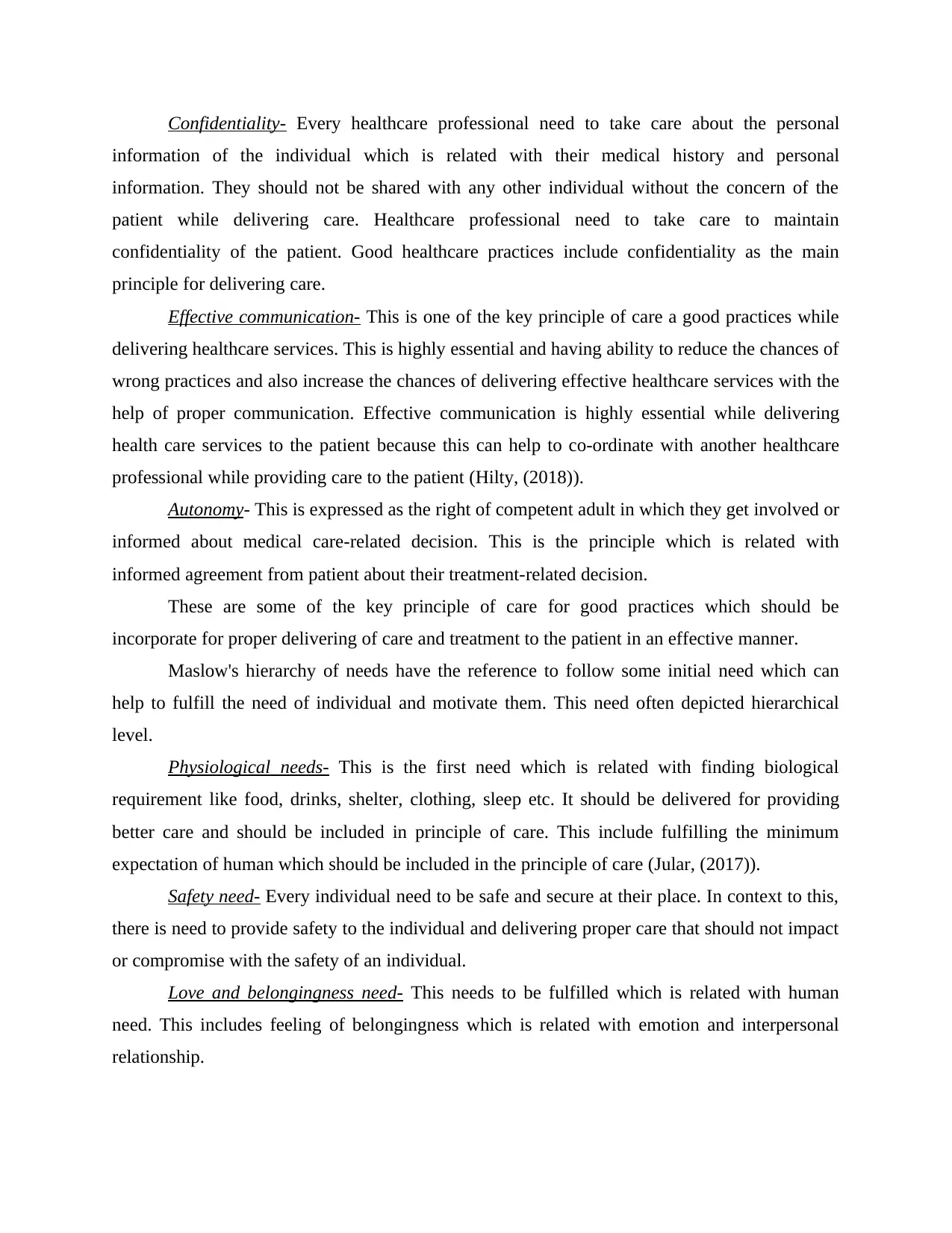
Confidentiality- Every healthcare professional need to take care about the personal
information of the individual which is related with their medical history and personal
information. They should not be shared with any other individual without the concern of the
patient while delivering care. Healthcare professional need to take care to maintain
confidentiality of the patient. Good healthcare practices include confidentiality as the main
principle for delivering care.
Effective communication- This is one of the key principle of care a good practices while
delivering healthcare services. This is highly essential and having ability to reduce the chances of
wrong practices and also increase the chances of delivering effective healthcare services with the
help of proper communication. Effective communication is highly essential while delivering
health care services to the patient because this can help to co-ordinate with another healthcare
professional while providing care to the patient (Hilty, (2018)).
Autonomy- This is expressed as the right of competent adult in which they get involved or
informed about medical care-related decision. This is the principle which is related with
informed agreement from patient about their treatment-related decision.
These are some of the key principle of care for good practices which should be
incorporate for proper delivering of care and treatment to the patient in an effective manner.
Maslow's hierarchy of needs have the reference to follow some initial need which can
help to fulfill the need of individual and motivate them. This need often depicted hierarchical
level.
Physiological needs- This is the first need which is related with finding biological
requirement like food, drinks, shelter, clothing, sleep etc. It should be delivered for providing
better care and should be included in principle of care. This include fulfilling the minimum
expectation of human which should be included in the principle of care (Jular, (2017)).
Safety need- Every individual need to be safe and secure at their place. In context to this,
there is need to provide safety to the individual and delivering proper care that should not impact
or compromise with the safety of an individual.
Love and belongingness need- This needs to be fulfilled which is related with human
need. This includes feeling of belongingness which is related with emotion and interpersonal
relationship.
information of the individual which is related with their medical history and personal
information. They should not be shared with any other individual without the concern of the
patient while delivering care. Healthcare professional need to take care to maintain
confidentiality of the patient. Good healthcare practices include confidentiality as the main
principle for delivering care.
Effective communication- This is one of the key principle of care a good practices while
delivering healthcare services. This is highly essential and having ability to reduce the chances of
wrong practices and also increase the chances of delivering effective healthcare services with the
help of proper communication. Effective communication is highly essential while delivering
health care services to the patient because this can help to co-ordinate with another healthcare
professional while providing care to the patient (Hilty, (2018)).
Autonomy- This is expressed as the right of competent adult in which they get involved or
informed about medical care-related decision. This is the principle which is related with
informed agreement from patient about their treatment-related decision.
These are some of the key principle of care for good practices which should be
incorporate for proper delivering of care and treatment to the patient in an effective manner.
Maslow's hierarchy of needs have the reference to follow some initial need which can
help to fulfill the need of individual and motivate them. This need often depicted hierarchical
level.
Physiological needs- This is the first need which is related with finding biological
requirement like food, drinks, shelter, clothing, sleep etc. It should be delivered for providing
better care and should be included in principle of care. This include fulfilling the minimum
expectation of human which should be included in the principle of care (Jular, (2017)).
Safety need- Every individual need to be safe and secure at their place. In context to this,
there is need to provide safety to the individual and delivering proper care that should not impact
or compromise with the safety of an individual.
Love and belongingness need- This needs to be fulfilled which is related with human
need. This includes feeling of belongingness which is related with emotion and interpersonal
relationship.
Paraphrase This Document
Need a fresh take? Get an instant paraphrase of this document with our AI Paraphraser
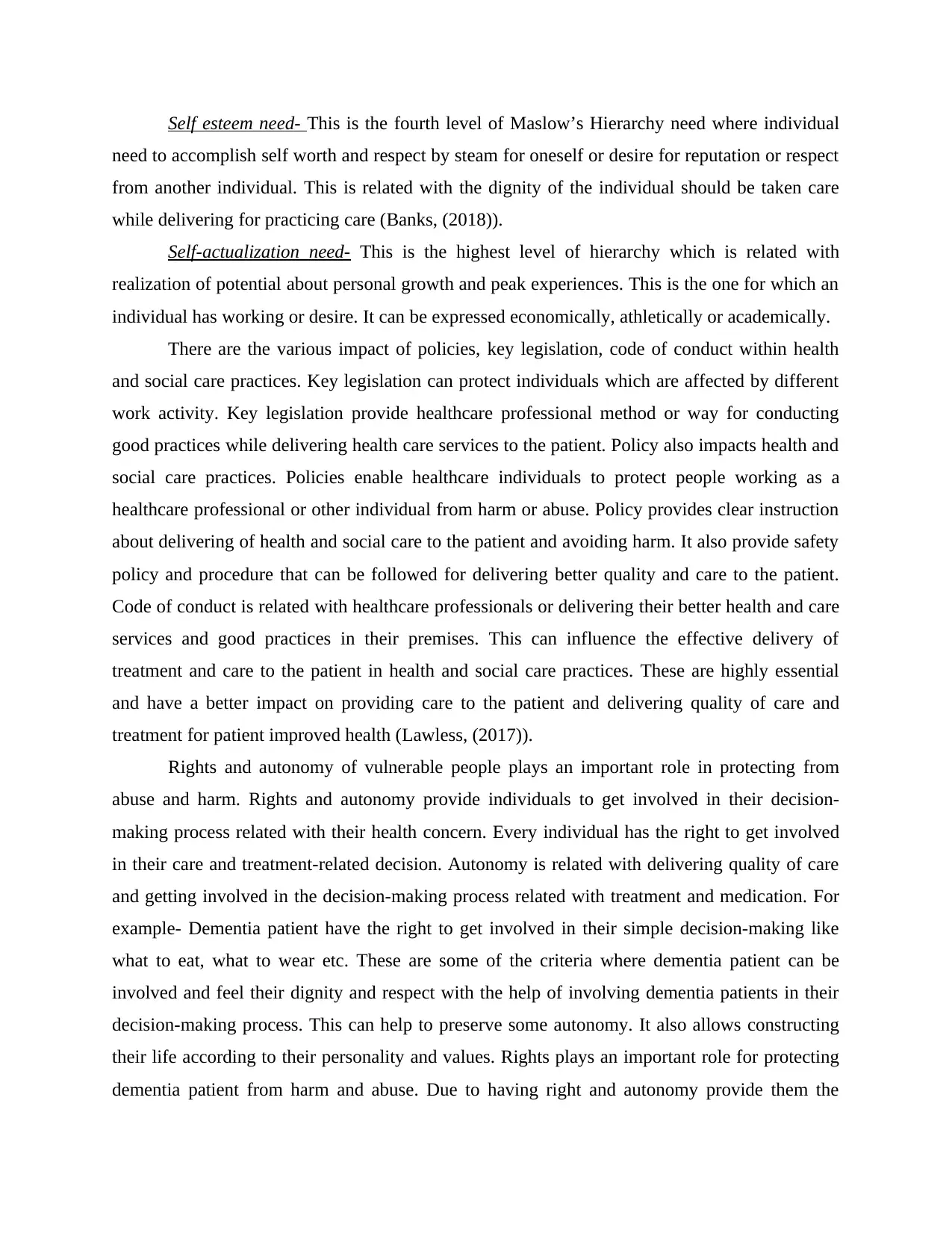
Self esteem need- This is the fourth level of Maslow’s Hierarchy need where individual
need to accomplish self worth and respect by steam for oneself or desire for reputation or respect
from another individual. This is related with the dignity of the individual should be taken care
while delivering for practicing care (Banks, (2018)).
Self-actualization need- This is the highest level of hierarchy which is related with
realization of potential about personal growth and peak experiences. This is the one for which an
individual has working or desire. It can be expressed economically, athletically or academically.
There are the various impact of policies, key legislation, code of conduct within health
and social care practices. Key legislation can protect individuals which are affected by different
work activity. Key legislation provide healthcare professional method or way for conducting
good practices while delivering health care services to the patient. Policy also impacts health and
social care practices. Policies enable healthcare individuals to protect people working as a
healthcare professional or other individual from harm or abuse. Policy provides clear instruction
about delivering of health and social care to the patient and avoiding harm. It also provide safety
policy and procedure that can be followed for delivering better quality and care to the patient.
Code of conduct is related with healthcare professionals or delivering their better health and care
services and good practices in their premises. This can influence the effective delivery of
treatment and care to the patient in health and social care practices. These are highly essential
and have a better impact on providing care to the patient and delivering quality of care and
treatment for patient improved health (Lawless, (2017)).
Rights and autonomy of vulnerable people plays an important role in protecting from
abuse and harm. Rights and autonomy provide individuals to get involved in their decision-
making process related with their health concern. Every individual has the right to get involved
in their care and treatment-related decision. Autonomy is related with delivering quality of care
and getting involved in the decision-making process related with treatment and medication. For
example- Dementia patient have the right to get involved in their simple decision-making like
what to eat, what to wear etc. These are some of the criteria where dementia patient can be
involved and feel their dignity and respect with the help of involving dementia patients in their
decision-making process. This can help to preserve some autonomy. It also allows constructing
their life according to their personality and values. Rights plays an important role for protecting
dementia patient from harm and abuse. Due to having right and autonomy provide them the
need to accomplish self worth and respect by steam for oneself or desire for reputation or respect
from another individual. This is related with the dignity of the individual should be taken care
while delivering for practicing care (Banks, (2018)).
Self-actualization need- This is the highest level of hierarchy which is related with
realization of potential about personal growth and peak experiences. This is the one for which an
individual has working or desire. It can be expressed economically, athletically or academically.
There are the various impact of policies, key legislation, code of conduct within health
and social care practices. Key legislation can protect individuals which are affected by different
work activity. Key legislation provide healthcare professional method or way for conducting
good practices while delivering health care services to the patient. Policy also impacts health and
social care practices. Policies enable healthcare individuals to protect people working as a
healthcare professional or other individual from harm or abuse. Policy provides clear instruction
about delivering of health and social care to the patient and avoiding harm. It also provide safety
policy and procedure that can be followed for delivering better quality and care to the patient.
Code of conduct is related with healthcare professionals or delivering their better health and care
services and good practices in their premises. This can influence the effective delivery of
treatment and care to the patient in health and social care practices. These are highly essential
and have a better impact on providing care to the patient and delivering quality of care and
treatment for patient improved health (Lawless, (2017)).
Rights and autonomy of vulnerable people plays an important role in protecting from
abuse and harm. Rights and autonomy provide individuals to get involved in their decision-
making process related with their health concern. Every individual has the right to get involved
in their care and treatment-related decision. Autonomy is related with delivering quality of care
and getting involved in the decision-making process related with treatment and medication. For
example- Dementia patient have the right to get involved in their simple decision-making like
what to eat, what to wear etc. These are some of the criteria where dementia patient can be
involved and feel their dignity and respect with the help of involving dementia patients in their
decision-making process. This can help to preserve some autonomy. It also allows constructing
their life according to their personality and values. Rights plays an important role for protecting
dementia patient from harm and abuse. Due to having right and autonomy provide them the
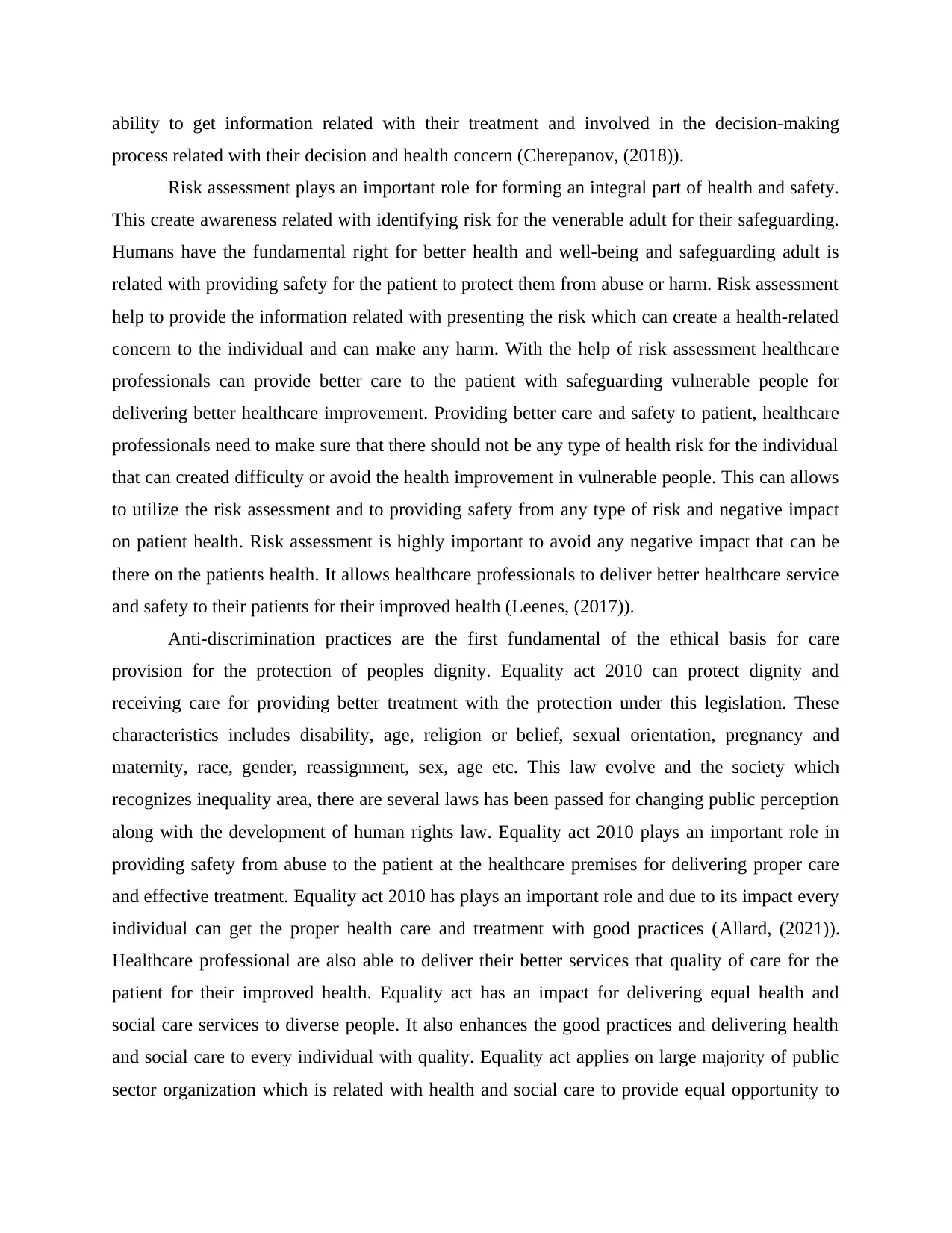
ability to get information related with their treatment and involved in the decision-making
process related with their decision and health concern (Cherepanov, (2018)).
Risk assessment plays an important role for forming an integral part of health and safety.
This create awareness related with identifying risk for the venerable adult for their safeguarding.
Humans have the fundamental right for better health and well-being and safeguarding adult is
related with providing safety for the patient to protect them from abuse or harm. Risk assessment
help to provide the information related with presenting the risk which can create a health-related
concern to the individual and can make any harm. With the help of risk assessment healthcare
professionals can provide better care to the patient with safeguarding vulnerable people for
delivering better healthcare improvement. Providing better care and safety to patient, healthcare
professionals need to make sure that there should not be any type of health risk for the individual
that can created difficulty or avoid the health improvement in vulnerable people. This can allows
to utilize the risk assessment and to providing safety from any type of risk and negative impact
on patient health. Risk assessment is highly important to avoid any negative impact that can be
there on the patients health. It allows healthcare professionals to deliver better healthcare service
and safety to their patients for their improved health (Leenes, (2017)).
Anti-discrimination practices are the first fundamental of the ethical basis for care
provision for the protection of peoples dignity. Equality act 2010 can protect dignity and
receiving care for providing better treatment with the protection under this legislation. These
characteristics includes disability, age, religion or belief, sexual orientation, pregnancy and
maternity, race, gender, reassignment, sex, age etc. This law evolve and the society which
recognizes inequality area, there are several laws has been passed for changing public perception
along with the development of human rights law. Equality act 2010 plays an important role in
providing safety from abuse to the patient at the healthcare premises for delivering proper care
and effective treatment. Equality act 2010 has plays an important role and due to its impact every
individual can get the proper health care and treatment with good practices (Allard, (2021)).
Healthcare professional are also able to deliver their better services that quality of care for the
patient for their improved health. Equality act has an impact for delivering equal health and
social care services to diverse people. It also enhances the good practices and delivering health
and social care to every individual with quality. Equality act applies on large majority of public
sector organization which is related with health and social care to provide equal opportunity to
process related with their decision and health concern (Cherepanov, (2018)).
Risk assessment plays an important role for forming an integral part of health and safety.
This create awareness related with identifying risk for the venerable adult for their safeguarding.
Humans have the fundamental right for better health and well-being and safeguarding adult is
related with providing safety for the patient to protect them from abuse or harm. Risk assessment
help to provide the information related with presenting the risk which can create a health-related
concern to the individual and can make any harm. With the help of risk assessment healthcare
professionals can provide better care to the patient with safeguarding vulnerable people for
delivering better healthcare improvement. Providing better care and safety to patient, healthcare
professionals need to make sure that there should not be any type of health risk for the individual
that can created difficulty or avoid the health improvement in vulnerable people. This can allows
to utilize the risk assessment and to providing safety from any type of risk and negative impact
on patient health. Risk assessment is highly important to avoid any negative impact that can be
there on the patients health. It allows healthcare professionals to deliver better healthcare service
and safety to their patients for their improved health (Leenes, (2017)).
Anti-discrimination practices are the first fundamental of the ethical basis for care
provision for the protection of peoples dignity. Equality act 2010 can protect dignity and
receiving care for providing better treatment with the protection under this legislation. These
characteristics includes disability, age, religion or belief, sexual orientation, pregnancy and
maternity, race, gender, reassignment, sex, age etc. This law evolve and the society which
recognizes inequality area, there are several laws has been passed for changing public perception
along with the development of human rights law. Equality act 2010 plays an important role in
providing safety from abuse to the patient at the healthcare premises for delivering proper care
and effective treatment. Equality act 2010 has plays an important role and due to its impact every
individual can get the proper health care and treatment with good practices (Allard, (2021)).
Healthcare professional are also able to deliver their better services that quality of care for the
patient for their improved health. Equality act has an impact for delivering equal health and
social care services to diverse people. It also enhances the good practices and delivering health
and social care to every individual with quality. Equality act applies on large majority of public
sector organization which is related with health and social care to provide equal opportunity to
⊘ This is a preview!⊘
Do you want full access?
Subscribe today to unlock all pages.

Trusted by 1+ million students worldwide
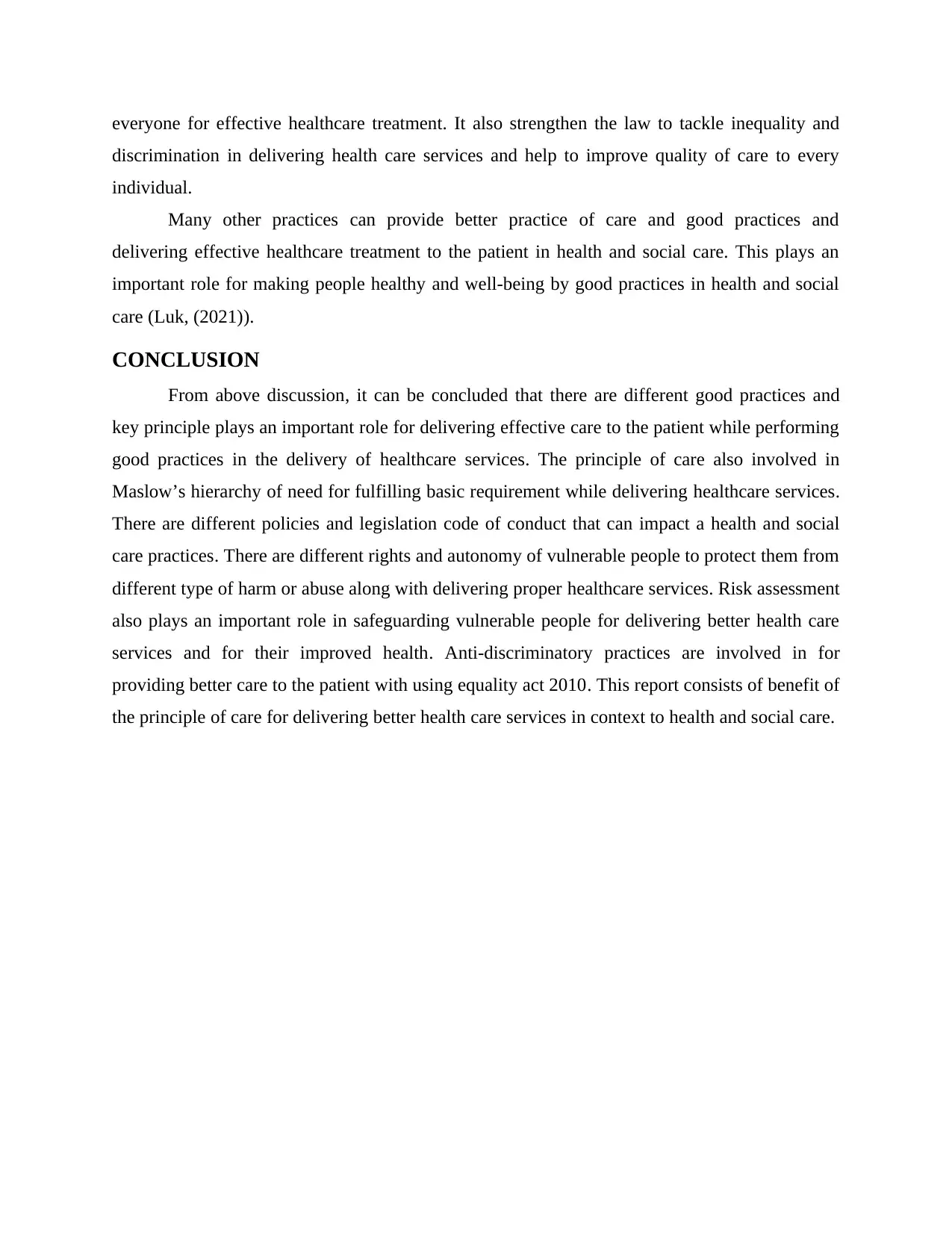
everyone for effective healthcare treatment. It also strengthen the law to tackle inequality and
discrimination in delivering health care services and help to improve quality of care to every
individual.
Many other practices can provide better practice of care and good practices and
delivering effective healthcare treatment to the patient in health and social care. This plays an
important role for making people healthy and well-being by good practices in health and social
care (Luk, (2021)).
CONCLUSION
From above discussion, it can be concluded that there are different good practices and
key principle plays an important role for delivering effective care to the patient while performing
good practices in the delivery of healthcare services. The principle of care also involved in
Maslow’s hierarchy of need for fulfilling basic requirement while delivering healthcare services.
There are different policies and legislation code of conduct that can impact a health and social
care practices. There are different rights and autonomy of vulnerable people to protect them from
different type of harm or abuse along with delivering proper healthcare services. Risk assessment
also plays an important role in safeguarding vulnerable people for delivering better health care
services and for their improved health. Anti-discriminatory practices are involved in for
providing better care to the patient with using equality act 2010. This report consists of benefit of
the principle of care for delivering better health care services in context to health and social care.
discrimination in delivering health care services and help to improve quality of care to every
individual.
Many other practices can provide better practice of care and good practices and
delivering effective healthcare treatment to the patient in health and social care. This plays an
important role for making people healthy and well-being by good practices in health and social
care (Luk, (2021)).
CONCLUSION
From above discussion, it can be concluded that there are different good practices and
key principle plays an important role for delivering effective care to the patient while performing
good practices in the delivery of healthcare services. The principle of care also involved in
Maslow’s hierarchy of need for fulfilling basic requirement while delivering healthcare services.
There are different policies and legislation code of conduct that can impact a health and social
care practices. There are different rights and autonomy of vulnerable people to protect them from
different type of harm or abuse along with delivering proper healthcare services. Risk assessment
also plays an important role in safeguarding vulnerable people for delivering better health care
services and for their improved health. Anti-discriminatory practices are involved in for
providing better care to the patient with using equality act 2010. This report consists of benefit of
the principle of care for delivering better health care services in context to health and social care.
Paraphrase This Document
Need a fresh take? Get an instant paraphrase of this document with our AI Paraphraser
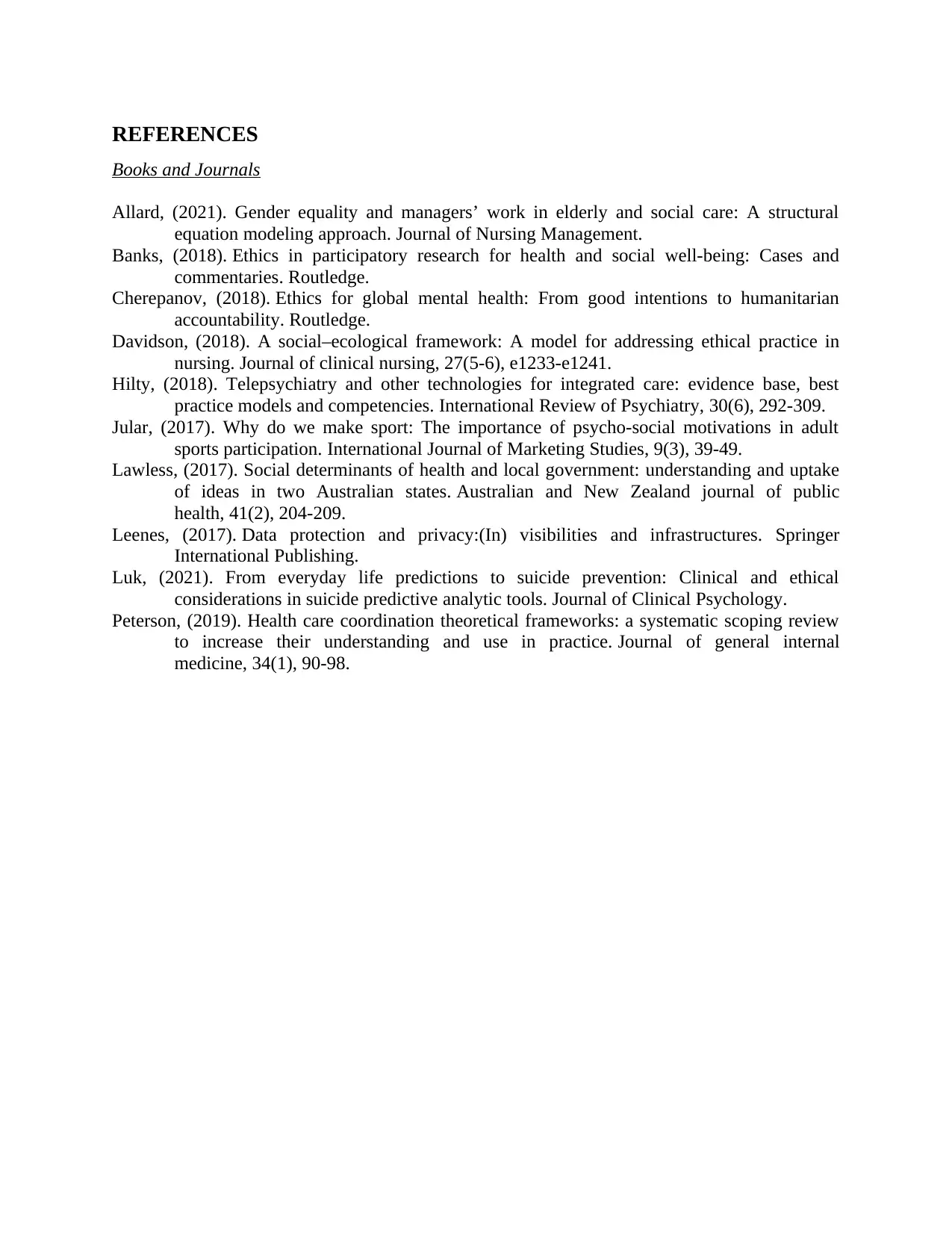
REFERENCES
Books and Journals
Allard, (2021). Gender equality and managers’ work in elderly and social care: A structural
equation modeling approach. Journal of Nursing Management.
Banks, (2018). Ethics in participatory research for health and social well-being: Cases and
commentaries. Routledge.
Cherepanov, (2018). Ethics for global mental health: From good intentions to humanitarian
accountability. Routledge.
Davidson, (2018). A social–ecological framework: A model for addressing ethical practice in
nursing. Journal of clinical nursing, 27(5-6), e1233-e1241.
Hilty, (2018). Telepsychiatry and other technologies for integrated care: evidence base, best
practice models and competencies. International Review of Psychiatry, 30(6), 292-309.
Jular, (2017). Why do we make sport: The importance of psycho-social motivations in adult
sports participation. International Journal of Marketing Studies, 9(3), 39-49.
Lawless, (2017). Social determinants of health and local government: understanding and uptake
of ideas in two Australian states. Australian and New Zealand journal of public
health, 41(2), 204-209.
Leenes, (2017). Data protection and privacy:(In) visibilities and infrastructures. Springer
International Publishing.
Luk, (2021). From everyday life predictions to suicide prevention: Clinical and ethical
considerations in suicide predictive analytic tools. Journal of Clinical Psychology.
Peterson, (2019). Health care coordination theoretical frameworks: a systematic scoping review
to increase their understanding and use in practice. Journal of general internal
medicine, 34(1), 90-98.
Books and Journals
Allard, (2021). Gender equality and managers’ work in elderly and social care: A structural
equation modeling approach. Journal of Nursing Management.
Banks, (2018). Ethics in participatory research for health and social well-being: Cases and
commentaries. Routledge.
Cherepanov, (2018). Ethics for global mental health: From good intentions to humanitarian
accountability. Routledge.
Davidson, (2018). A social–ecological framework: A model for addressing ethical practice in
nursing. Journal of clinical nursing, 27(5-6), e1233-e1241.
Hilty, (2018). Telepsychiatry and other technologies for integrated care: evidence base, best
practice models and competencies. International Review of Psychiatry, 30(6), 292-309.
Jular, (2017). Why do we make sport: The importance of psycho-social motivations in adult
sports participation. International Journal of Marketing Studies, 9(3), 39-49.
Lawless, (2017). Social determinants of health and local government: understanding and uptake
of ideas in two Australian states. Australian and New Zealand journal of public
health, 41(2), 204-209.
Leenes, (2017). Data protection and privacy:(In) visibilities and infrastructures. Springer
International Publishing.
Luk, (2021). From everyday life predictions to suicide prevention: Clinical and ethical
considerations in suicide predictive analytic tools. Journal of Clinical Psychology.
Peterson, (2019). Health care coordination theoretical frameworks: a systematic scoping review
to increase their understanding and use in practice. Journal of general internal
medicine, 34(1), 90-98.
1 out of 8
Related Documents
Your All-in-One AI-Powered Toolkit for Academic Success.
+13062052269
info@desklib.com
Available 24*7 on WhatsApp / Email
![[object Object]](/_next/static/media/star-bottom.7253800d.svg)
Unlock your academic potential
Copyright © 2020–2026 A2Z Services. All Rights Reserved. Developed and managed by ZUCOL.



